-
 bitcoin
bitcoin $87959.907984 USD
1.34% -
 ethereum
ethereum $2920.497338 USD
3.04% -
 tether
tether $0.999775 USD
0.00% -
 xrp
xrp $2.237324 USD
8.12% -
 bnb
bnb $860.243768 USD
0.90% -
 solana
solana $138.089498 USD
5.43% -
 usd-coin
usd-coin $0.999807 USD
0.01% -
 tron
tron $0.272801 USD
-1.53% -
 dogecoin
dogecoin $0.150904 USD
2.96% -
 cardano
cardano $0.421635 USD
1.97% -
 hyperliquid
hyperliquid $32.152445 USD
2.23% -
 bitcoin-cash
bitcoin-cash $533.301069 USD
-1.94% -
 chainlink
chainlink $12.953417 USD
2.68% -
 unus-sed-leo
unus-sed-leo $9.535951 USD
0.73% -
 zcash
zcash $521.483386 USD
-2.87%
How to participate in Lido governance
Lido governance allows LDO token holders to shape the protocol’s future by voting on upgrades, parameter changes, and integrations.
Jul 22, 2025 at 05:49 pm
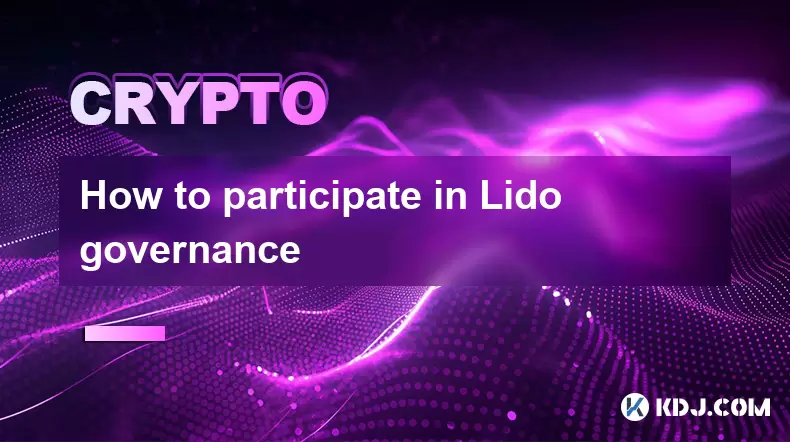
What is Lido Governance?
Lido Finance is a decentralized finance (DFI) protocol that allows users to stake their Ethereum (ETH) without locking up assets or maintaining infrastructure. In return, users receive staked ETH tokens (stETH), which represent their share of the staked ETH and accrued rewards. Lido governance is the decentralized mechanism through which token holders influence the protocol’s future development, including upgrades, parameter changes, and integration decisions.
Participating in Lido governance means actively contributing to decision-making by proposing changes or voting on existing proposals. Governance is open to all holders of LDO tokens, which are the native governance tokens of the Lido ecosystem. LDO token holders can submit proposals or vote on proposals that impact the protocol.
How to Connect Your Wallet to Lido Governance
To participate in Lido governance, you must first connect a compatible Ethereum wallet. MetaMask is the most commonly used wallet for interacting with decentralized applications (dApps), including Lido. Ensure that your wallet contains LDO tokens, as these are required to propose or vote on governance decisions.
- Open your MetaMask wallet and switch to the Ethereum mainnet.
- Visit the Lido governance page at https://vote.lido.fi/.
- Click the “Connect Wallet” button located in the top right corner of the page.
- Select your wallet provider (e.g., MetaMask).
- Confirm the connection in your wallet.
Once connected, your LDO balance will be displayed, and you will be able to interact with ongoing governance proposals.
How to Vote on Lido Governance Proposals
After connecting your wallet and confirming your LDO token balance, you can proceed to vote on active governance proposals. Each proposal will have a voting period, typically lasting several days. Voting power is determined by the number of LDO tokens you hold and have delegated.
- Navigate to the “Proposals” section on the Lido governance page.
- Review the list of active proposals to understand their implications.
- Click on a proposal to view detailed information, including the proposer, summary, and discussion threads.
- Scroll down to the voting section and select either “For,” “Against,” or “Abstain.”
- Confirm your vote in your wallet.
It is crucial to review each proposal thoroughly before casting your vote. Voting is non-refundable in terms of gas fees, so ensure you are comfortable with your decision before proceeding.
How to Create a Lido Governance Proposal
If you wish to propose a change to the Lido protocol, you must meet the minimum LDO token requirement to create a proposal. This threshold ensures that only serious and committed participants can initiate governance discussions.
- Ensure you have the required number of LDO tokens delegated to your wallet.
- Go to the Lido governance page and click on the “Create Proposal” button.
- Fill in the proposal details, including title, content, and any supporting documentation or links.
- Confirm the transaction in your wallet to submit the proposal.
Once submitted, your proposal will enter a cooling-off period, after which it will be listed for community voting. During this time, other LDO holders can review and discuss your proposal.
How Delegation Works in Lido Governance
If you hold LDO tokens but do not wish to actively participate in governance, you can delegate your voting power to another address. Delegation allows token holders to assign their voting rights to a trusted delegate without transferring ownership of their tokens.
- Visit the Lido governance page and click on your profile or wallet address.
- Locate the delegation section and enter the address of the delegate you wish to support.
- Confirm the delegation in your wallet.
You can change or revoke your delegation at any time. Delegated votes are counted toward the delegate’s total voting power during proposal votes.
Frequently Asked Questions
Q: Can I participate in Lido governance without LDO tokens?A: No, LDO tokens are required to participate in Lido governance. You must hold or delegate LDO to vote on or create proposals.
Q: Is there a minimum amount of LDO needed to create a proposal?A: Yes, there is a minimum threshold of LDO tokens required to create a governance proposal. This threshold helps prevent spam and ensures proposers have a vested interest in the protocol.
Q: How long do Lido governance votes last?A: The voting period for Lido governance proposals typically lasts around 4 days, though this may vary depending on the proposal type and urgency.
Q: Can I change my vote after submitting it?A: No, once a vote is submitted on-chain, it cannot be changed. Ensure you carefully consider your decision before casting your vote.
Disclaimer:info@kdj.com
The information provided is not trading advice. kdj.com does not assume any responsibility for any investments made based on the information provided in this article. Cryptocurrencies are highly volatile and it is highly recommended that you invest with caution after thorough research!
If you believe that the content used on this website infringes your copyright, please contact us immediately (info@kdj.com) and we will delete it promptly.
- No More Pocket Bricks: Tracker Cards Offer the Sleek AirTag Wallet Fix Solution
- 2026-02-01 22:10:02
- Trump's Northern Blast: How Canada Remarks Jolted WLFI Price and Shook Crypto Holders
- 2026-02-01 21:55:01
- Bitcoin Navigates Bear Market Blues Amidst a Weakening Dollar: A Shifting Crypto Landscape
- 2026-02-01 22:10:02
- Dogecoin's Rollercoaster: Navigating Moonshot Dreams Amidst Memecoin Risks
- 2026-02-01 22:05:01
- Bitcoin Price Drops: Key Factors Fueling the Sell-Off and What Comes Next
- 2026-02-01 22:05:01
- Bitcoin and Crypto Market Experience Wild Weekend Crash: What You Need to Know
- 2026-02-01 22:00:01
Related knowledge
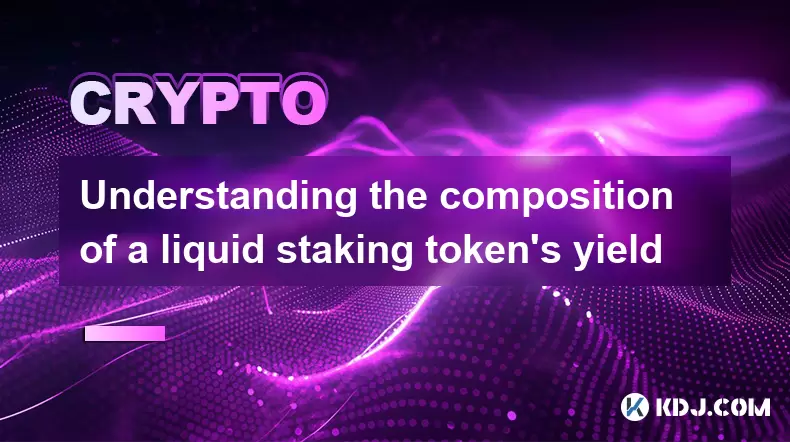
Understanding the composition of a liquid staking token's yield
Jul 20,2025 at 09:07am
What Is a Liquid Staking Token?A liquid staking token is a representative asset issued to users who stake their native cryptocurrency on a proof-of-st...
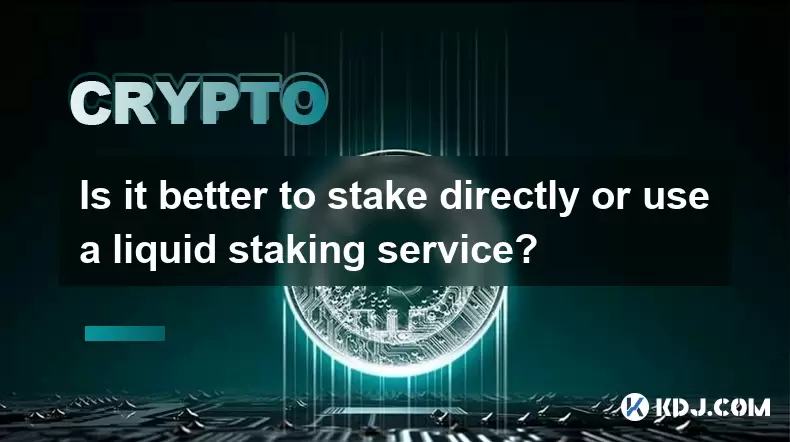
Is it better to stake directly or use a liquid staking service?
Jul 22,2025 at 08:21pm
Understanding the Basics of StakingStaking in the context of blockchain and cryptocurrency refers to the process of locking up digital assets to suppo...
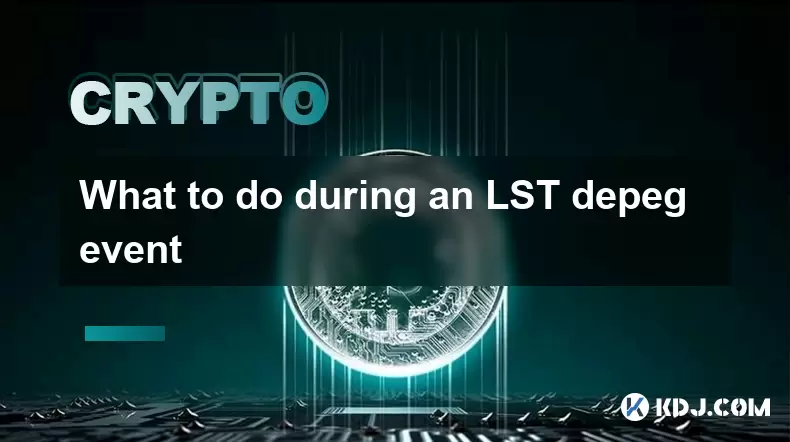
What to do during an LST depeg event
Jul 20,2025 at 04:57pm
Understanding LST Depeg EventsAn LST (Liquid Staking Token) depeg event occurs when the token, which is typically pegged to the value of the underlyin...
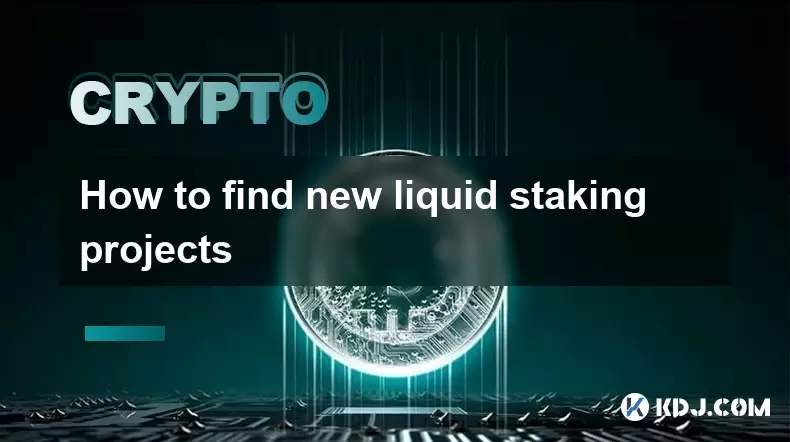
How to find new liquid staking projects
Jul 30,2025 at 01:14pm
Understanding Liquid Staking and Its ImportanceLiquid staking is a mechanism that allows users to stake their cryptocurrency assets while still mainta...
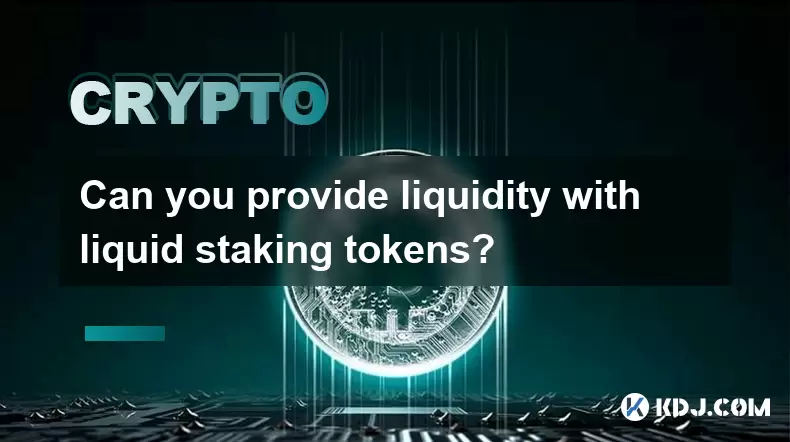
Can you provide liquidity with liquid staking tokens?
Jul 22,2025 at 10:22am
Understanding Liquid Staking TokensLiquid staking tokens (LSTs) are derivative tokens that represent staked assets on a proof-of-stake (PoS) blockchai...
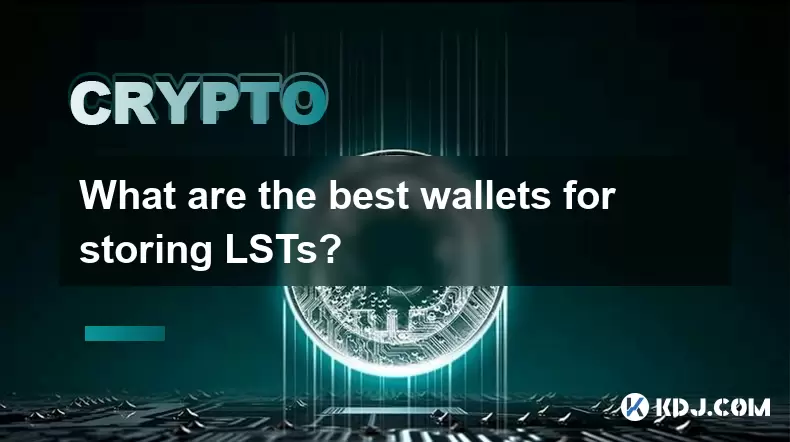
What are the best wallets for storing LSTs?
Jul 21,2025 at 03:14pm
Understanding LSTs and the Need for Secure StorageLSTs, or Liquid Staking Tokens, are derivative tokens representing staked assets on a blockchain. Wh...

Understanding the composition of a liquid staking token's yield
Jul 20,2025 at 09:07am
What Is a Liquid Staking Token?A liquid staking token is a representative asset issued to users who stake their native cryptocurrency on a proof-of-st...

Is it better to stake directly or use a liquid staking service?
Jul 22,2025 at 08:21pm
Understanding the Basics of StakingStaking in the context of blockchain and cryptocurrency refers to the process of locking up digital assets to suppo...

What to do during an LST depeg event
Jul 20,2025 at 04:57pm
Understanding LST Depeg EventsAn LST (Liquid Staking Token) depeg event occurs when the token, which is typically pegged to the value of the underlyin...

How to find new liquid staking projects
Jul 30,2025 at 01:14pm
Understanding Liquid Staking and Its ImportanceLiquid staking is a mechanism that allows users to stake their cryptocurrency assets while still mainta...

Can you provide liquidity with liquid staking tokens?
Jul 22,2025 at 10:22am
Understanding Liquid Staking TokensLiquid staking tokens (LSTs) are derivative tokens that represent staked assets on a proof-of-stake (PoS) blockchai...

What are the best wallets for storing LSTs?
Jul 21,2025 at 03:14pm
Understanding LSTs and the Need for Secure StorageLSTs, or Liquid Staking Tokens, are derivative tokens representing staked assets on a blockchain. Wh...
See all articles
























![[Audio stories] Streamer Became a Billionaire Overnight After Buying One Junk Coin [Audio stories] Streamer Became a Billionaire Overnight After Buying One Junk Coin](/uploads/2026/02/01/cryptocurrencies-news/videos/origin_697eaa9a495ed_image_500_375.webp)

















































